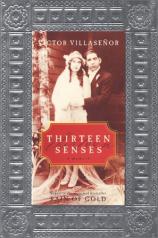Reading Group Guide
Discussion Questions
Thirteen Senses: A Memoir

1. Villaseñor opens the book as Lupe and Salvador's families gather to celebrate the couple's second wedding, 50 years after they first exchanged rings. How does this raucous, emotional ceremony set the stage for the story that follows? How do the wedding and the participants' behavior compare with your own family celebrations?
2. "Always remember that men are mineral," Lupe's mother advises her. "Women are vegetation. That's why the two will always have difficulties." Throughout the book, Villaseñor raises the issue of differences between the sexes. Do you agree with this theory? Are men and women's inherent differences so contradictory that, "it's a miracle that they ever come together at all"?
3. Lupe and Salvador have enormous regard for their own - and each other's - mothers. Margarita, especially, emerges as a powerful, mystical figure capable of miracles and possessing profound wisdom. How did you react to Villaseñor's portrayal of his grandmother? How does Lupe's own maternal power compare to that of her "mother-in-love"?
4. Margarita's religious practices are a fascinating combination of Roman Catholicism, mestizo beliefs, mysticism, and "New Age" philosophy. How does her spirituality compare with your own? Do you believe it is possible to adhere to pieces of a religion, without embracing the entire belief system?
5. What do you think of Margarita's conversations with God, Mary, Jesus, and the Devil? Does her easy relationship with them strike you as heretical?
6. What do you think about the book's mystical aspects? Do you believe that Margarita actually prevented Salvador from disaster and death - or was it luck? Was Domingo really visited by ten-thousand angels while in prison? Is it true, as Salvador claims, that "there is no way a person can talk in English about miracles and angels without sounding, well, kind of phony or holier than thou"? Do you need to have a basic understanding of Mexican/Indian culture to appreciate the miracles in this book?
7. What, if anything, did you learn about America's Great Depression, and its impact on Mexican immigrants, from reading this memoir? Do you think the impact of the Depression was less severe for immigrants because they were accustomed to poverty? Or was it harder, because they had given up so much to come to America, only to see their Promised Land crumble?
8. Villaseñor makes a number of wonderfully astute observations about the differences between Latino and Anglo cultures. For instance, Salvador can not imagine questioning the authority of the church or its priests even if what Lupe's German obstetrician claims is true: "Listen to the priests about those matters that have to do with God, but not about women and children. What can a priest possibly know? The poor men live a very limited life." Likewise, Margarita comments that American doctors "only knew how to heal the body like a mechanic fixing a car." In what other ways do Lupe, Salvador and their families find American ways shocking? Do you think these cultural differences exist today?
9. At the beginning of this memoir, Villaseñor asks this question about his parents' relationship: "Was it love? Had it ever really been love?" What do you think? How might Lupe and Salvador's conceptions of love have changed over the course of their marriage?
10. It's easy to forget that Villaseñor's book is a memoir, and not a novel. Why is this? How does knowing that the characters and events are real alter the way you feel about certain aspects of the story, such as Salvador's bootlegging and Archie's corruption? Is it easier to feel sympathy for fictional characters because their actions are not real?
11. Do you think Salvador was a good man? How would you have responded to your own daughter marrying such a person? Do you think Lupe should have left her husband after she found out the truth about how he earned a living?
12. How does your family history compare with this story of the Villaseñor family? What do family legends contribute to our sense of ourselves?
13. Villaseñor doesn't list the thirteen senses until the end of the book because, he writes, if he had, "people wouldn't have experienced the book." As you review the story of Lupe and Salvador's married life, can you identify the thirteen senses? How would your experience of the book been different if Villaseñor declined to list them at all?
Thirteen Senses: A Memoir
- Publication Date: August 21, 2001
- Hardcover: 528 pages
- Publisher: Rayo
- ISBN-10: 0066210771
- ISBN-13: 9780066210773







